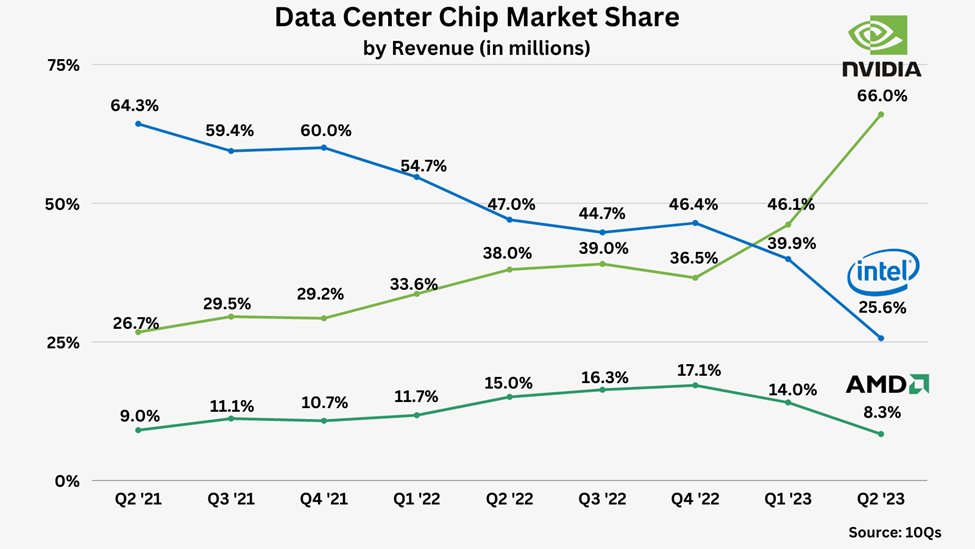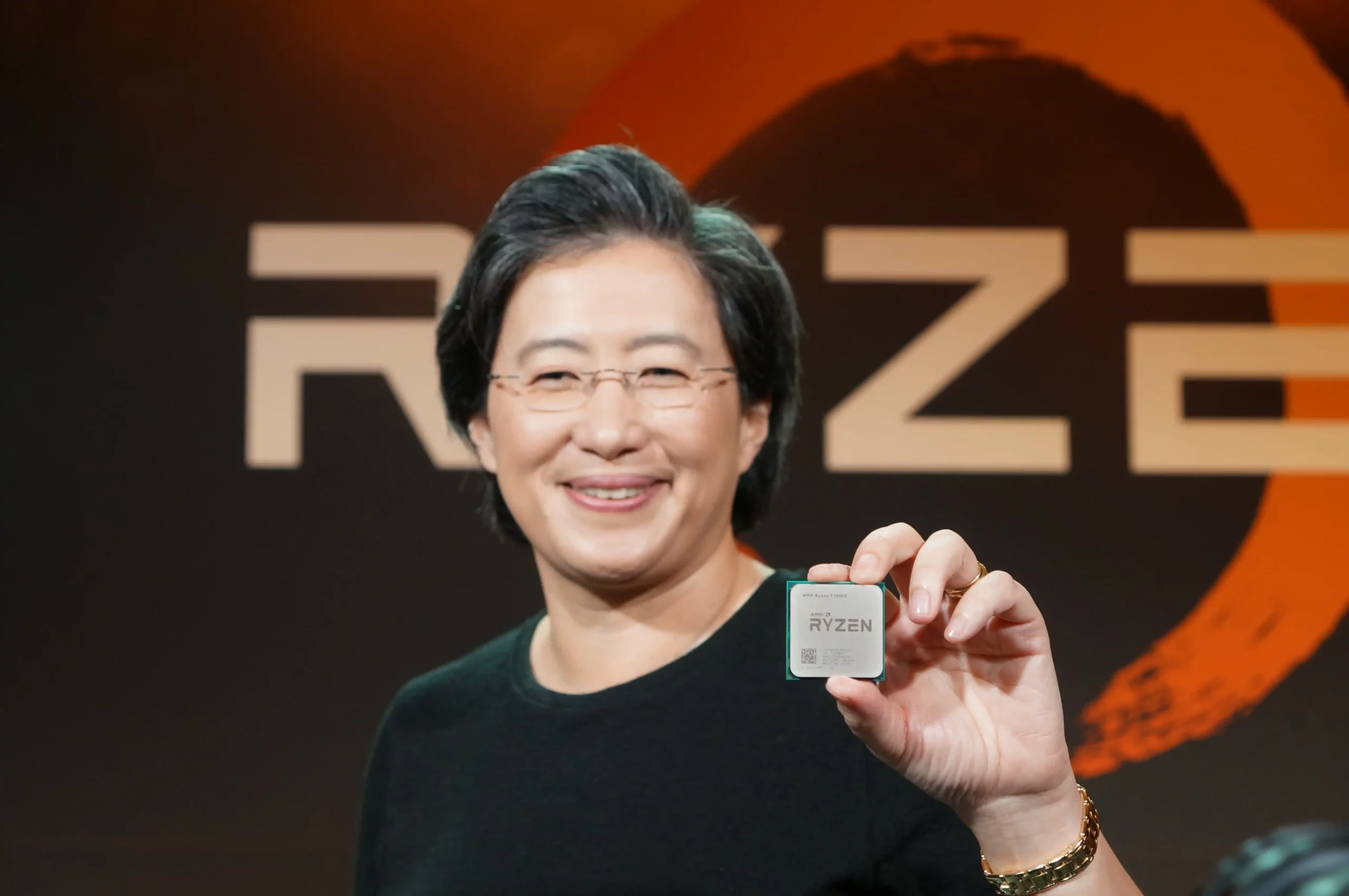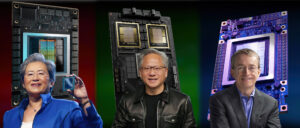The AI PC Race Heats Up: AMD Unveils Next-Gen Processors
In a rapidly evolving tech landscape, the quest for dominance in AI-enabled personal computing has intensified. Advanced Micro Devices (AMD), a leading chip design firm, recently threw down the gauntlet with the unveiling of its latest ryzen processors tailored for AI PCs. With a strategic move to leverage cutting-edge 4-nanometer technology, AMD aims to stake its claim in this burgeoning market segment, poised for explosive growth.
Follow us on Linkedin for everything around Semiconductors & AI
AMD Foray into AI PC Territory with Ryzen
AMD’s announcement introduces the Ryzen Pro 8040 series for laptops and the Ryzen Pro 8000 series for desktops, heralded as the most potent chips yet for business PCs. These processors are not merely incremental upgrades; they signify a leap forward in computational power and efficiency.
Equipped to handle AI tasks such as real-time language translation and summarization, these chips mark AMD’s strategic pivot towards capturing the burgeoning demand for AI-capable computing devices.
Ryzen PRO 8040 Series: AMD designed this series for business laptops and mobile workstations, claiming it to be “the most advanced x86 processors built” for these categories.
Ryzen PRO 8000 Series: This series is the first “AI-enabled desktop processor for business users” according to AMD. It prioritizes both strong performance and low power consumption.
Both lines are said to leverage a combination of CPU, GPU, and a dedicated Neural Processing Unit (NPU) to deliver improved AI processing power compared to previous generations. This NPU is what sets them apart as AI-focused processors.
The AMD Ryzen PRO 8000 and 8040 series processors boast several features that make them well-suited for AI-enabled PCs:
Integrated Neural Processing Unit (NPU): This is a major differentiator. Unlike previous Ryzen processors, these include a dedicated NPU for handling AI workloads. NPUs outperform traditional CPUs in specific AI tasks, potentially delivering a significant performance boost for applications heavily reliant on AI.
Zen 4 Architecture: The latest Zen 4 architecture underpins these processors, offering overall performance improvements over previous generations. This translates to faster processing speeds for both general computing tasks and AI workloads.
Improved Efficiency: AMD claims these processors offer better power efficiency compared to prior models. This is important, especially for laptops (Ryzen Pro 8040) where battery life is a concern.
Security Features: Being part of the Ryzen Pro line, these processors come with additional security features targeted towards business users, such as hardware-based virtualization and memory encryption.
Overall, the combination of a dedicated NPU, the latest Zen 4 architecture, and improved efficiency makes these processors attractive for users who work with AI applications on a daily basis.
The Competitive Landscape
The unveiling of AMD’s new processors intensifies the competition with industry giants Nvidia and Intel. While Nvidia has long been synonymous with cutting-edge graphics processing units (GPUs), Intel has maintained its stronghold in the CPU market.

However, with the proliferation of AI applications, the dynamics are shifting. Nvidia’s dedicated GPUs for AI tasks and Intel’s Core Ultra chips aimed at embedding AI capabilities in PCs underscore the fierce competition to cater to the evolving needs of consumers and businesses alike.
The Implications of AI PC Adoption
An AI PC is a personal computer specifically designed to handle tasks that involve artificial intelligence (AI).
Here’s a breakdown of the key features:
Hardware: AI PCs typically have processors with built-in Neural Processing Units (NPUs) alongside the usual Central Processing Unit (CPU) and Graphics Processing Unit (GPU). NPUs are specialized chips optimized for efficient AI workloads, while CPUs and GPUs can also contribute to AI processing but may not be as efficient.
Software: AI PCs can benefit from software that’s designed to leverage the NPU and other hardware for AI tasks. This might include applications for:
- Machine learning: Training and running machine learning models for tasks like image recognition, natural language processing, and data analysis.
- Generative AI: Using AI to create new content like images, text, or music.
- Advanced applications: Running complex AI-powered programs for scientific computing, engineering simulations, or creative media production.
Benefits of AI PCs:
- Faster AI processing: The dedicated NPU and optimized hardware can significantly speed up AI tasks compared to traditional PCs.
- Improved efficiency: NPUs can handle AI workloads with lower power consumption, which is especially important for laptops.
- Enhanced capabilities: AI PCs can unlock new possibilities for users who work with AI applications regularly.
It’s important to note that AI PCs are a relatively new concept. While major chipmakers like AMD and Intel are pushing the technology, AI PCs are not yet mainstream. Users with specific workflows that heavily rely on AI, such as data scientists, engineers, or creative professionals, are likely the target audience for these processors.
As AI PCs gain traction, industry experts foresee a paradigm shift in computing paradigms. The integration of AI capabilities directly into personal computing devices heralds a new era of efficiency and productivity.
From gaming to content creation, AI-enabled PCs promise immersive experiences and streamlined workflows. As major chipmakers vie for market share, consumers stand to benefit from a plethora of choices and increasingly powerful computing solutions.
Conclusion: The Dawn of the AI PC Era
In conclusion, AMD’s unveiling of its next-gen processors for AI PCs marks a significant milestone in the evolution of personal computing. As AI capabilities become increasingly integral to everyday tasks, the race to deliver more efficient and powerful computing solutions has reached fever pitch. With AMD, Nvidia, and Intel locked in fierce competition, consumers can expect a wave of innovation that promises to redefine the possibilities of AI-enabled personal computing. As the industry charts its course into the AI PC era, one thing is certain: the future of computing has never looked more exciting.




